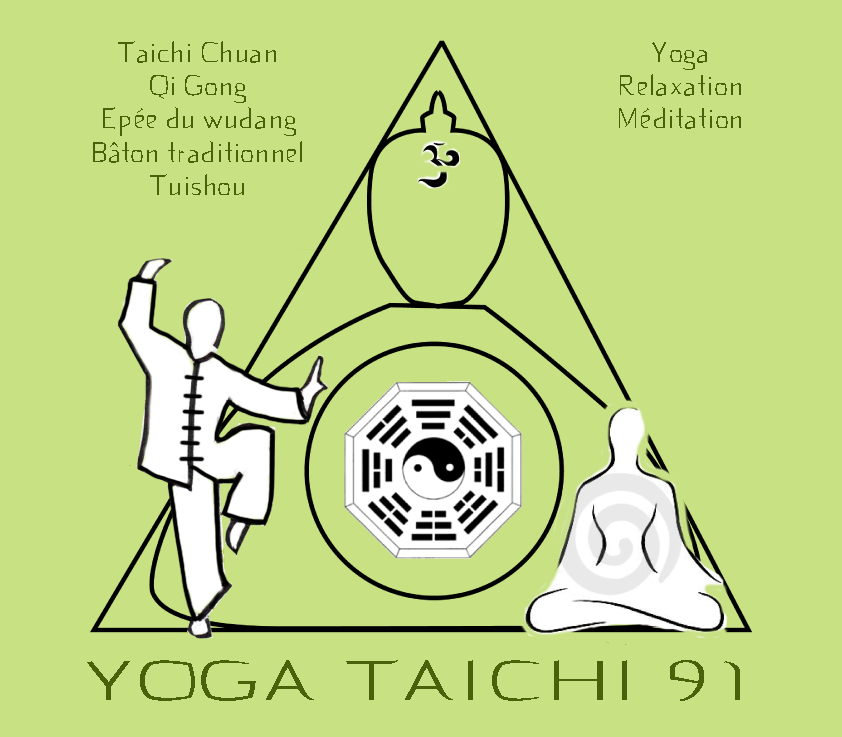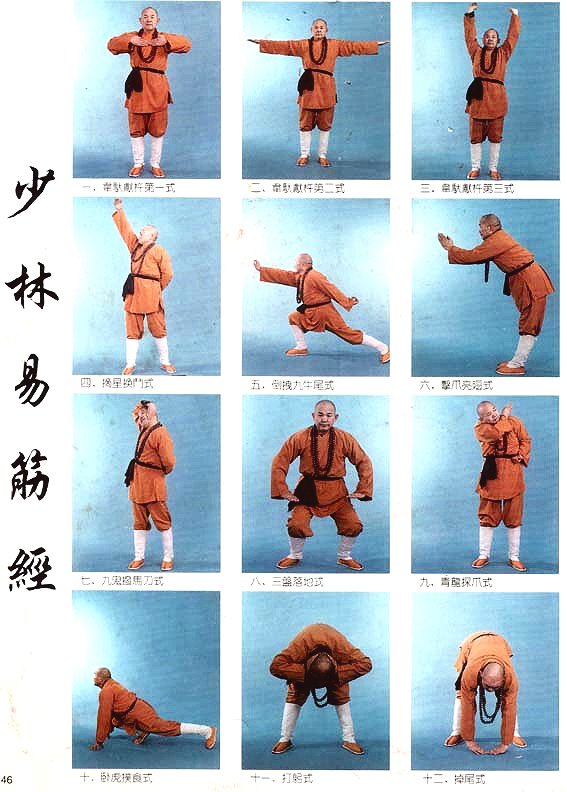YOGA TAICHI 91
Alliance harmonieuse du Taichi chuan , du Qiqong , Yoga et de la Méditation

YOGA TAICHI 91
Christian RASOTTO
1 Bd de BRETAGNE
91160 LONGJUMEAU
06 17 08 68 09
01 69 09 42 67
shanti91160@gmail.com
Qigong Yi Jing Jin
Yi Jin Jing Translation of the book / DVD library by Annick Bulthé
Chapter 1.Origins and development
It is believed that the exercises Yi Jin Jing originate primitive shamanic rituals.The earliest description of these exercises, is treated in literature: History of Han Dynasty, which dates from about 2000 years.A painting on cloth of brocade Illustration of the flow of Qi was discovered in the 1970s, inside an ancient tomb in Changsha City in central China.
It shows more than 40 years of drawings, models of basic movement exercises Yi Jin Jing current.It is generally accepted that the Yi Jin Jing exercises were developed by the Buddhist monk Bodhidharma Indian who is also the origin of Shaolin Martial Arts.
We know so sure Bodhidharma arrived in 526 BC at the Shaolin Temple Songshan Mountains in Henan Province in central China.According to legend, he is the founder of Zen Buddhism in China and invented the practice of Buddhism Dhyana or meditation deep.The monks of Shaolin Temple played a large role in the evolution of Yi Jin Jing exercises.
As the practice of Dhyana required long and quiet sitting, the monks used the martial arts (Wushu) to stretch their bodies after meditation.Number of work on the Yi Jin Jing has been published in the Song dynasty (960 1279).
Among these is best of the Taoist doctrine, developed by Zhang Junfang, commissioned by the Emperor.The oldest modern explanation of the exercises is 12 movements in Illustration of internal exercises written in 1858 by Pan Wei Qing Dynasty.
As Yi Jin Jing is based on traditional Chinese medicine and its theory of five elements (metal, wood, water, fire and earth) different schools have emerged to these exercises, emphasizing this aspect in a lot of work.
Qi Gong Yi Jin Jing Health has integrated the best of the series of 12 movements of traditional Yi Jin Jing to a modern scientific approach.The movements form a continuum, focusing on stretching the tendons and bones flexibility, combining strength and softness.
An essential component of this sequence is the natural breathing, associated with calm of mind, so that vital energy flows as freely as possible.Chapter 2.Features gentle movements and extended to stretch the bones and tendons.

Whichever body part worked, the movements of the Yi Jin Jing ask the bones and joints associated with a full range of motion of extensions, bending, bending and torsion.All these movements are multidirectional and large-scale.When the bones bend, groups of muscles, tendons and ligaments are stretched.
This improves blood circulation and nutrition of the soft tissues of the area affected by the movement, increases flexibility and flexibility of soft tissues such as muscles, tendons and ligaments and improves mobility of the bones, joints and muscles.And regular gentle movement for a harmonious coordination.
The authors re-developed the series of 12 movements of traditional Yi Jin Jing adding transitions between the different movements so that the whole is more clear and graceful.The movements of this exercise are multidirectional, limb flexion is simple or circular, with a wingspan of natural movement given by the axis of the joints.The movements are not taken to slow and graceful.When force is required, it must be applied gradually, the muscles must be relaxed to combine strength and delicacy.There is no complex or repetitive motion, and all exercises run with large movements, continuous, graceful, coordinated and quiet.
Update on the bending and twisting of the spine.Main body axis, the spine consists of vertebrae, ligaments and spinal cord.The Yi Jin Jing exercises are focused on the twisting, bending and stretching of the spine, with the size for axis.
These movements help the spinal cord and nerves to perform their functions more effectively, together with exercises of members and internal organs.The execution of these series with a relaxed body and calm mind can improve health and fitness, prevent disease, prolong life and improve the intellect.
* YI = transformation, change * tendon * = JIN JING JING JIN YI = energy = transform the quality of the tendons to improve the level of health.This method consists of 12 movements that must be performed accurately.
1) A St. offers his weapon
2) Support the universe
3) Support the door of heaven
4) Pick a star and rotate
5) Pull the tail of the Nine Oxen
6) Open his wings and push a mountain
7) The Nine Ghosts draw swords
8) The roots burrow into the soil
9) Extend the claw and Exit the Dragon
10) The Tiger pounces on its prey
11) Big greetings
12) Looking to move its tail



